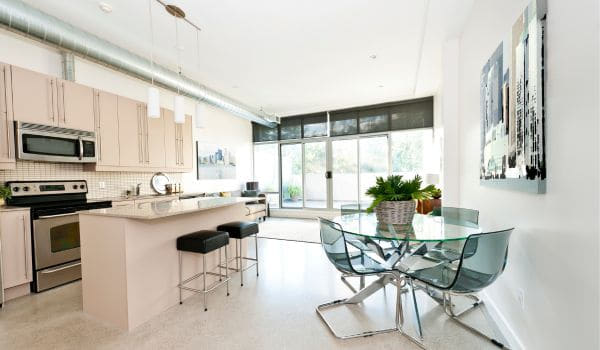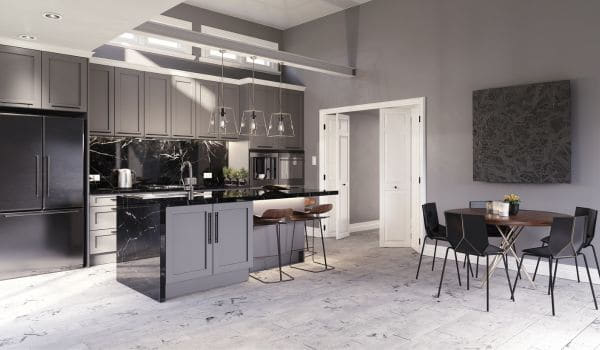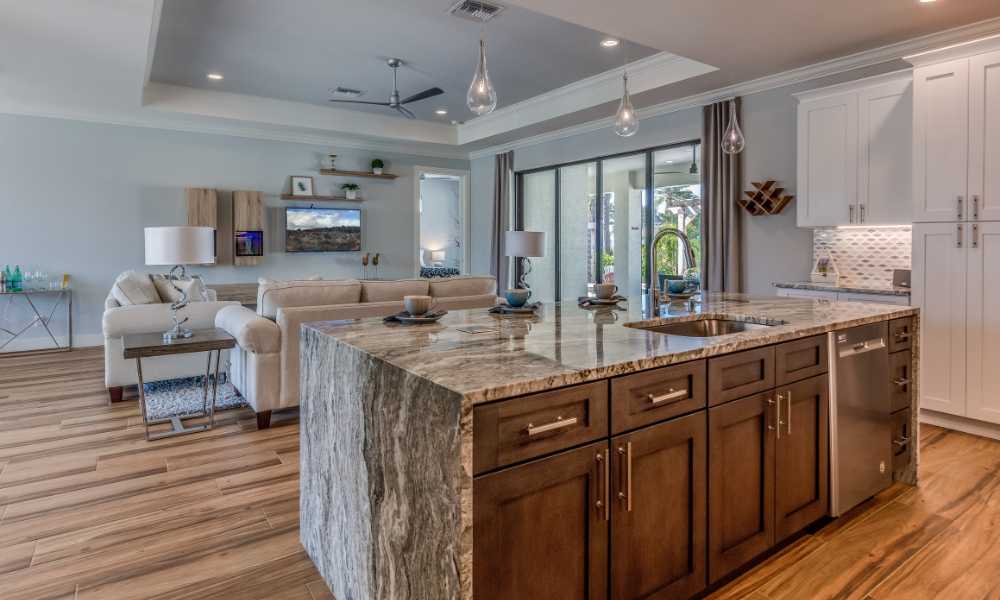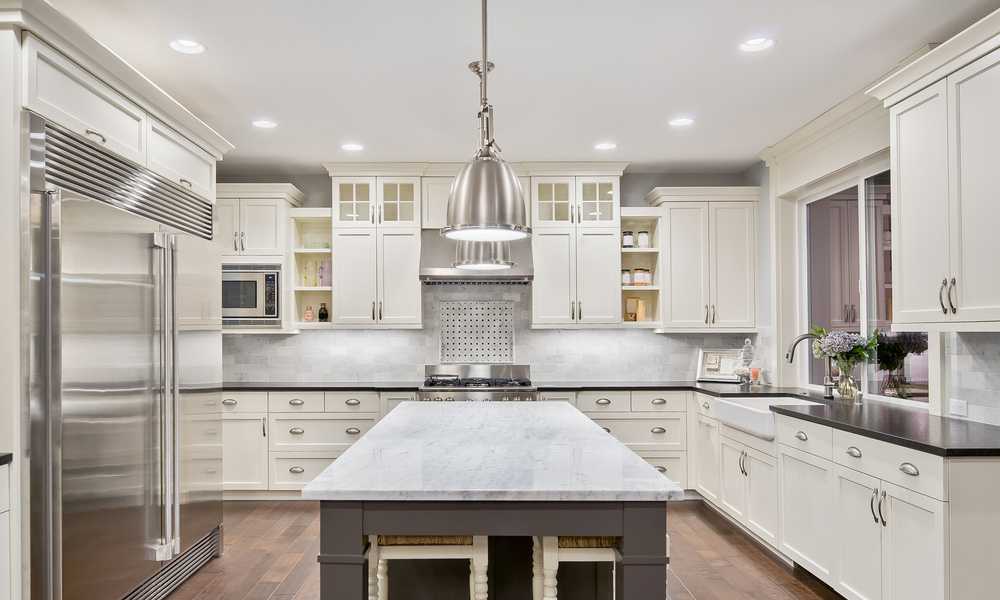Embellishing your kitchen island is a splendid opportunity to infuse style and function into the epicenter of your home. A tastefully decorated kitchen island not only serves as a focal point in your culinary space but also enhances its versatility and utility, accommodating everything from food preparation to intimate gatherings. Whether your preference leans towards minimalist elegance or a homely, rustic charm, the right decorations can significantly elevate your kitchen island, making it a striking feature that complements the overall ambiance of your kitchen. This guide will provide you with innovative and pragmatic ideas to decorate your kitchen island, ensuring it not only captures attention but also resonates with your personal taste and lifestyle needs.
Functional Elements

Utilizing Storage Space
Incorporating Baskets or Bins
Maximizing space efficiency by using baskets or bins for storing kitchen essentials. Opting for aesthetically pleasing containers that align with the overall design
Installing Shelves or Drawers
Introducing open shelves for easy accessibility and display of frequently used items. Implementing drawers for organized storage of utensils, cutlery, or kitchen tools
Practicality in Design
Choosing Durable and Easy-to-Clean Materials
Prioritizing materials that withstand the rigors of kitchen activities. Selecting surfaces that are easy to clean and maintain for a functional and hygienic space
Considering the Workflow in the Kitchen
Arranging the island layout to facilitate a smooth and efficient workflow. Ensuring easy access to essential tools and ingredients during cooking and meal preparation
Aesthetic Elements

Color Coordination
Selecting a Color Scheme that Complements the Overall Kitchen Design
Harmonizing the island’s color palette with the surrounding kitchen decor. Ensuring a cohesive and visually pleasing integration of colors.
Using Contrasting Colors for Visual Interest
Introducing contrasting colors to create focal points and add visual dynamism. Balancing the use of colors to prevent overwhelming the space
Decorative Accents
Incorporating Decorative Bowls, Vases, or Trays
Enhancing the island’s visual appeal with stylish and functional decorative items. Choosing accessories that reflect personal taste while maintaining a clutter-free look
Adding Plants or Flowers for a Touch of Nature
Bringing a natural element into the kitchen with potted plants or fresh flowers. Enhancing the island’s aesthetic with a touch of greenery for a lively atmosphere
Personalized Items
Displaying Personal or Sentimental Items
Showcasing items that hold personal significance, such as family heirlooms or mementos. Creating a personalized and welcoming atmosphere through carefully chosen items
Customizing with Unique Decor Pieces
Adding unique decor pieces that reflect individual style and preference. Incorporating elements that make the kitchen island a distinctive and memorable feature
Lighting

Lighting plays a crucial role in transforming a kitchen island from a functional space to a visually appealing and inviting area. Properly chosen lighting enhances both the practical aspects of the island and the overall atmosphere of the kitchen.
Pendant Lights
Choosing Appropriate Pendant Lighting Styles
Pendant lights come in a variety of styles, shapes, and sizes, allowing homeowners to make a statement or seamlessly integrate them into the existing aesthetic. Consideration should be given to the island’s size, design theme, and overall layout. For instance, sleek and modern pendant lights may complement a contemporary kitchen, while vintage or industrial styles can add character to a more rustic setting.
Ensuring Proper Illumination for Tasks and Ambiance
Pendant lights over an island should not only contribute to the overall ambiance but also provide adequate illumination for tasks such as food preparation and cooking. Balancing ambient and task lighting ensures a well-lit workspace, enhancing both functionality and visual appeal. Adjustable pendant fixtures can be particularly beneficial, allowing homeowners to customize the lighting intensity based on their specific needs.
Under-Cabinet Lighting
Enhancing Visibility on the Kitchen Island
Under-cabinet lighting serves a dual purpose by illuminating the countertop workspace on the island and creating a subtle yet impactful aesthetic. LED strips or puck lights installed beneath cabinets offer focused lighting, reducing shadows and enhancing visibility for various activities. This type of lighting is particularly effective in highlighting the island’s functional elements and decorative accents.
Creating a Warm and Inviting Atmosphere
Beyond its practicality, under-cabinet lighting contributes to the overall ambiance of the. Choosing warm-toned lights can create a cozy and inviting atmosphere, turning the island into a gathering space for family and friends. Dimmable options provide flexibility, allowing homeowners to adjust the lighting to suit different occasions and moods.
Seasonal Decor

Adapting the decor of the island to the changing seasons adds a dynamic and refreshing element to the space. This approach allows homeowners to infuse seasonal themes and colors, keeping the design lively and current throughout the year.
Adapting Decor for Different Seasons
Incorporating Seasonal Colors and Motifs
Changing the color scheme and decor elements on the island based on the season can instantly refresh the space. For example, bright and vibrant hues may be used during spring and summer, while warmer tones and cozy accessories can be introduced in the fall and winter. Seasonal motifs such as floral arrangements or beach-themed decor can further enhance the thematic transition.
Changing Decor Elements to Reflect the Time of Year
Rotating decor items like table runners, placemats, or seasonal centerpieces allows for a quick and budget-friendly transformation of the island. Adapting to holidays or special occasions within each season adds a personal touch and keeps the decor in sync with the broader seasonal context.
Space Management

Effective space management is crucial in ensuring that a decorated island remains both functional and visually appealing. By avoiding clutter and strategically creating focal points, homeowners can optimize the use of space for practical tasks and aesthetic enhancements.
Avoiding Clutter
Selecting a Limited Number of Decor Items
To prevent the kitchen island from feeling overwhelmed, it’s essential to exercise restraint when choosing decorative items. Selecting a limited number of carefully curated decor pieces allows each element to shine individually, contributing to a cohesive and well-balanced aesthetic. Minimalist design principles can guide the selection process, promoting a clean and uncluttered appearance.
Ensuring Sufficient Space for Food Preparation
While decor is essential, maintaining ample space for food preparation is equally crucial. Striking a balance between decorative elements and functional workspace ensures that the island remains a practical and efficient area for cooking and meal preparation. Adequate counter space enables smooth workflow, making daily tasks more enjoyable and efficient.
Creating Focal Points
Designating Specific Areas for Attention
Intentional design can guide the eye to specific areas of the island, creating focal points that draw attention and add visual interest. This can be achieved by strategically placing standout decor items or incorporating unique design elements in certain areas. For example, a striking centerpiece or a decorative backsplash can serve as a focal point, elevating the island’s overall visual appeal.
Balancing Decorative Elements Across the Island
Creating a sense of equilibrium is essential in designing an aesthetically pleasing island. Distributing decorative elements evenly across the surface helps maintain visual balance. Consider the island as a canvas, with each decor item contributing to a cohesive and harmonious composition. This approach prevents any single area from appearing overloaded while ensuring a unified and inviting atmosphere.
Conclusion
The art of decorating an island extends beyond mere aesthetics to include thoughtful space management. By avoiding clutter through the selection of a limited number of decor items and ensuring sufficient space for food preparation, homeowners can maintain the island’s functionality while enhancing its visual appeal. Creating focal points strategically and balancing decorative elements across the island contribute to a well-designed and harmonious kitchen space. The island, when adorned with care and attention to space management principles, becomes a versatile and inviting centerpiece within the home.





